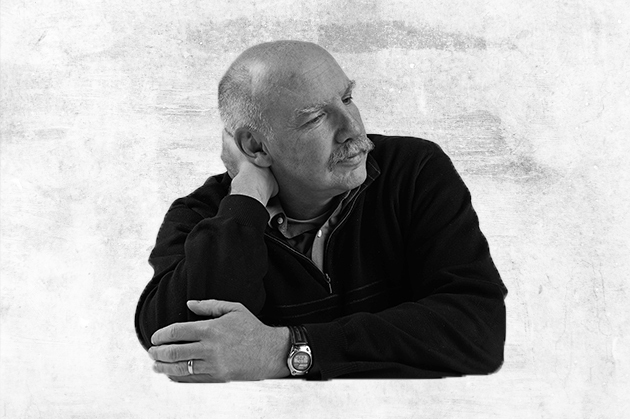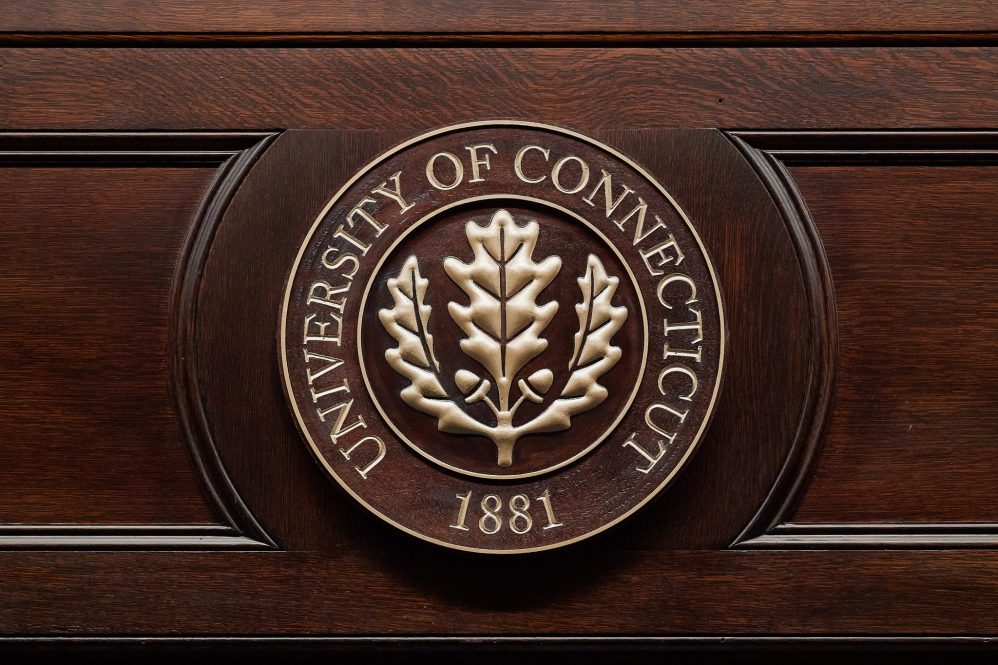This article was first published in the Spring 2014 print edition of UConn Magazine. To access more stories like this, visit s.uconn.edu/spring 14 or download UConn Magazine’s free app for tablet devices.
It was 1933 when UConn students so insightfully designated the husky as the symbol of strength, grit, and resolve that has come to define the true spirit of the University. In this special feature, UConn Magazine invited 11 proud UConn alumni to speak out about what defines them, from their darkest struggles to their greatest triumphs. And no matter how different their backgrounds, their hardships, or the mistakes they may have made along the way, that same enduring strength and indomitable spirit remains, living on at the heart of every Husky.
[yframe url=’http://www.youtube.com/watch?v=GoXi25WnvAY’]
On Oct. 18, 1987, Phillip Valentine was in the birthing room at Rockville General Hospital in Vernon, Conn., high on cocaine and waiting for the arrival of his first child, a baby girl. He describes what happened next as a religious experience.
“I was in a kind of cocaine-induced haze, and when my daughter looked into my eyes, there was so much love and spiritual power,” he says. “That’s when God burned his way into my soul and said, ‘You’re not alone.’”
Two months later, Valentine went to his first 12-Step meeting. He began attending a different 12-Step meeting every day for 90 days – the standard recommendation for people new to the program.
He had quit drinking on his own a couple of years earlier, only to become addicted to cocaine. Valentine, who had long dreamed of becoming a head professional at a major golf course, or even playing on the PGA tour, had found work as a municipal course pro – but then lost that job because of his drug addiction. Shortly afterward, he and his wife split up. He moved in with his mother and took odd jobs selling furniture, life insurance, and investments.
Despite all of these setbacks, he pushed through the recovery program, going on to remarry in 1993 and, in 1999, landing a position as the associate director of the Connecticut Community for Addiction Recovery (CCAR), an organization that provides assistance to people in recovery, and advocates at the state level for policies and priorities that are pro-recovery. Now the center’s executive director, Valentine was named the nonprofit executive of the year in 2009 by Hartford Business Journal. This past December, he celebrated his 26th year of sobriety.
When he was first hired at CCAR, Valentine hesitated to go public with his story. Eventually he decided that if he was going to advocate on behalf of people in recovery, he needed to come clean about his own past. “I realized that God had performed a miracle in my life,” he says. “Who was I to hide it under a bushel basket?”
The purpose in my life, I’ve been blessed to find, is to carry the message of recovery. … Integrity is, for me, to live true to that calling. —Philip Valentine ’87 (CLAS)
In 2010, just when everything seemed to be going smoothly, Valentine was diagnosed with Stage 4 oralpharyngeal cancer – cancer of the tongue. When friends asked why he didn’t seem upset – why he didn’t ask ‘why me?’ – he had a ready answer: “Well, why not me? If I truly am a man of faith and integrity, then why not? Let’s show people how to go through this, whether I live or die.”
For a while, because of the pain in his mouth and throat from chemotherapy and radiation treatment, Valentine couldn’t eat or taste food, and watched helplessly as the weight seemed to fall off him. Even once the cancer was in remission, his ordeal wasn’t over. He experienced severe withdrawal when he tapered off his pain medication. One day, while he was fighting the symptoms, he says he heard God suggest him to walk the Appalachian Trail – a strange command, since he had never even visited the trail.
“God whispered to me – I don’t know how else to say it,” Valentine says. “I just wrote it off. But it kind of grew into a fire.”
To motivate himself during his cancer recovery, Valentine started reading book after book about the Appalachian Trail, buying hiking equipment, and going on long walks to prepare himself physically. When he asked CCAR’s board of directors whether he could take a half-year sabbatical to walk the trail, to his surprise the organization agreed to sponsor the walk, as long as he used the journey to promote the national recovery movement.
Valentine plans to leave for the trip on March 19, 2015, the fifth anniversary of his cancer diagnosis. He figures it will take five to six months to hike the trail, averaging 11 to 12 miles a day. In each state he passes through, he plans to give talks and meet with recovery community leaders. He’ll document the trip in real time through social media and hopes to write a book about the experience.
“This is the biggest adventure I have taken in my life. I have no idea whether I can do the whole thing, I have no idea what it’s going to be like, but I have a lot of people rooting for me and a lot of support,” Valentine says. “So I like my chances.”
Hear an audio clip from UConn Magazine‘s one-on-one interview with Valentine:
Listen to Valentine’s advice to those dealing with addiction.
Keep track of Phillip Valentine ’87 (CLAS) as he prepares for his adventures on the Appalachian Trail by reading his blog at hookedonrecovery.com/blog or following him on Instagram @philv59.














